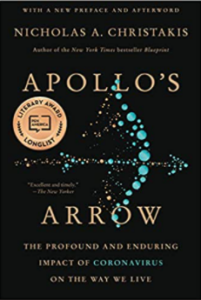Book Review
Apollo’s Arrow: The Profound and Enduring Impact of the Coronavirus on the Way We Live.
by Christakis, Nicholas A.
Book Review Submitted by Jenn Albanese, CPO Staff
 You may feel like you have consumed more information on Covid-19 than you’d like, but Apollo’s Arrow gives both an opportunity to consider how our society has been changed by Covid-19 and reassurance that someday we will see the virus in our rearview mirror. The author is a physician and a sociologist, and Christakis reviews a science-based review of the events of 2020. He also describes the path of Covid-19 as it traveled through many different cultures and how regional differences affected response time and damage done by the virus.
You may feel like you have consumed more information on Covid-19 than you’d like, but Apollo’s Arrow gives both an opportunity to consider how our society has been changed by Covid-19 and reassurance that someday we will see the virus in our rearview mirror. The author is a physician and a sociologist, and Christakis reviews a science-based review of the events of 2020. He also describes the path of Covid-19 as it traveled through many different cultures and how regional differences affected response time and damage done by the virus.
Historical context creates stark differences as well. The deadly Spanish Influenza of 1918 took a devastating path through troops deployed in World War I. The “my mask protects you, your mask protects me” approach amongst Americans made mask wearing an act of patriotism, and a way to protect our troops. The same mantra had mixed results during Covid-19 response in 2020, when some saw mask wearing as an infringement on individual rights. The concept of being masked and being an American was greatly impacted by historical and social context.
Chat & Chowder: Interview with Dr. Nicholas Christakis: Apollo’s Arrow from WGBH
The author is also an expert in social networks, and his discussion on the social nature of individual people infected, and the implications for disease spread, is interesting. I would suggest reading this book in its paper form; the author presents data visually for many of these complex examples that are hard to view on an e-reader. Discussion is dry at times but, at least for me, provides a different lens on the growth patterns of the virus that has been the backdrop of our lives for the last 18 months, one that the author predicts will weaken as it mutates.
Viruses are a glimpse at evolution and our society has been pressed to evolve in ways that may have seemed unimaginable. Some changes may look like de-evolutions; one of the author’s predictions is that physical contact in person-to-person greetings may never look the same. Small retailers may bend to large corporations with contactless service. Other changes may lead to social good, like increased opportunities for remote work, less plane fuel used for business travel, and increased health hygiene measures. There are many take-aways from this text but the one I liked best was the author’s assurance that “plagues always end.”

